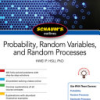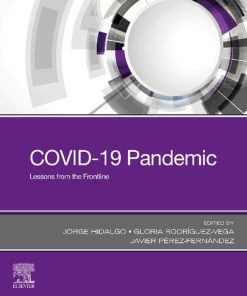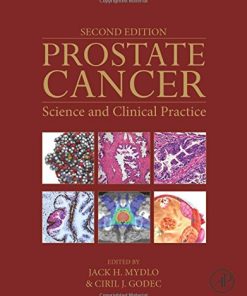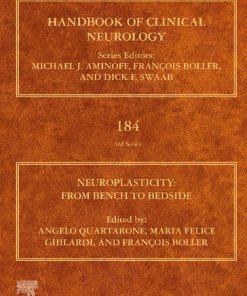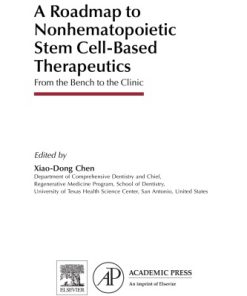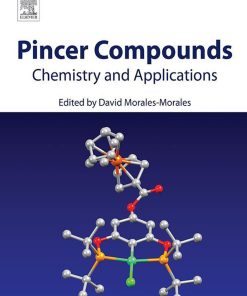(Ebook PDF) Immunotherapy in Resistant Cancer From the Lab Bench Work to Its Clinical Perspectives 1st edition by Jorge Morales Montor, Mariana Segovia Mendoza 0128220295 9780128220290 full chapters
$50.00 Original price was: $50.00.$25.00Current price is: $25.00.
Immunotherapy in Resistant Cancer: From the Lab Bench Work to Its Clinical Perspectives 1st edition by Jorge Morales-Montor, Mariana Segovia-Mendoza – Ebook PDF Instant Download/DeliveryISBN: 0128220295, 9780128220290
Full download Immunotherapy in Resistant Cancer: From the Lab Bench Work to Its Clinical Perspectives 1st edition after payment.
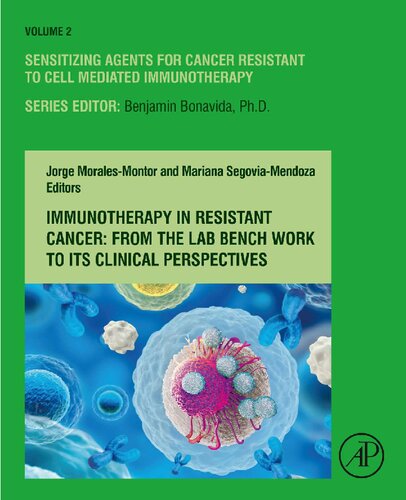
Product details:
ISBN-10 : 0128220295
ISBN-13 : 9780128220290
Author : Jorge Morales-Montor, Mariana Segovia-Mendoza
Immunotherapy in Resistant Cancer: From the Lab Bench Work to Its Clinical Perspectives provides high level knowledge on detailed mechanisms of actions and biological interactions of different immune drugs, with an aim of offering researchers and clinicians cutting-edge therapies to overcome drug resistance. The book explains the latest immunotherapies for different types of cancer, helping users carry out research projects or create alternatives for drug development in the pharmaceutical industry. Topics discussed include the relationship between immunotherapy and macrophages, immune checkpoints in different types of cancer, immune cocktails in solid tumors, and immune-phenotyping.
Immunotherapy in Resistant Cancer: From the Lab Bench Work to Its Clinical Perspectives 1st Table of contents:
Chapter 1: Cancer vs immune tolerance-The challenge of fighting “self´´
Introduction
Immune tolerance
Mechanisms of immune tolerance
Central tolerance
Peripheral tolerance
Peripheral clonal deletion
Anergy induction
Inhibitory cytokines
Regulatory cells
Immune recognition of cancer. When only self is left
Conclusion
References
Chapter 2: Immunoconjugates as immune canoes to kill breast cancer cells
Introduction
Breast cancer classification
Immunoconjugates
Mechanism of action of the Ims
Immunoconjugate structure
Antibody portion
Effector molecules
Chemical components
Auristatins
Benzodiazepines
Calicheamicins
Camptothecins and deruxtecan
Cryptophycins
Duocarmycin
Doxorubicin
Hemiasterlins
Maytansinoids
Taxanes
Tubulysins
Biological components
Cytokines
Effector immune cells
RNases and toxins
Linkers
Cleavable linkers
Lysosomal protease-sensitive linkers
Acid-sensitive linkers
Glutathione-sensitive disulfide linker
Non-cleavable linkers
Ims proved in breast cancer
Conclusion
Acknowledgments
References
Chapter 3: New intratumoral immunotherapeutic approaches to inhibit the tumor growth and metastasis
Introduction
Intratumoral injections
Bacteria
Animal testing
Cytokines secreted by cells
Animal testing
Human research
Chimeric cells
Animal testing
Human research
Cytokines and adjuvants
Animal testing
Cytokines contained in biodegradable microspheres
Animal testing
Cytokines expressed in viral vectors
Animal testing
Combined treatments
Cytokines expressed in viral vectors and bacteria
Animal testing
Cytokines expressed in viral vectors and blockade immune checkpoints
Animal testing
New theoretical strategies
Multi-needle injection
Nanotechnology
Immunostimulatory monoclonal antibodies delivered by implant
Animal testing
Chemokines contained in tumor targeted nanoparticles
Animal testing
Conclusion
Acknowledgments
References
Chapter 4: The Fas/FasL pathway as a target for enhancing anticancer adoptive cell therapy
Introduction
Non-specific cell therapies
Role of Fas/FasL pathway in LAK cell therapies
Role of Fas/FasL pathway in CIK cell therapies
Role of Fas/FasL pathway in NK cell therapies
Specific cell therapies
Role of Fas/FasL pathway in tumor-infiltrating lymphocyte (TIL) therapy
Role of Fas/FasL pathway in engineered T cell receptor (TCR) therapy
Role of Fas/FasL pathway in chimeric antigen receptors (CAR)-T cell therapy
Conclusion
Acknowledgments
References
Chapter 5: Harnessing metabolism for reinvigorating dysfunctional T cells in cancer
Introduction
Basics of metabolism
The metabolism of T cells during activation
The role of mitochondria in T cell metabolic reprogramming
Metabolic alterations observed in cancer-associated T cells
Glucose depletion and lactate accumulation
Effect of immunosuppressive cytokines and metabolites on T cell metabolism
Metabolic T cell exhaustion in cancer
Mitochondrial defects in T cells induced by the tumor microenvironment
Targeting metabolism for restoring anti-tumoral T cell responses
Conclusion
References
Chapter 6: The IgM as a tool for recognition of early tumoral antigens
Introduction
Natural IgM and breast cancer
Conclusion
Acknowledgments
References
Chapter 7: The inflammation during colorectal cancer: A friend or a foe?
Introduction
Acute inflammation has a physiological role in the colon
Do we have evidence that chronic inflammation is promoting both CAC and CRC?
The paradoxical role of inflammation between CAC and CRC
Are either inflammatory bowel diseases or Th17 inflammatory pathway associated with CAC and CRC deve
A paradox: protective role of inflammatory cytokines, transcription factors, and immune cells during
Inflammatory transcription factors involved in protection
Inflammatory immune cells involved in protection
Immunotherapy and chemotherapy in colon cancer
Is the microbiota involved in the promotion of inflammation during CAC and CRC?
Conclusion
Acknowledgments
References
Chapter 8: Environmental pollution as a risk factor to develop colorectal cancer: The role of endocr
Introduction
Environmental pollution and disease
Endocrine-disrupting chemicals and cancer
Colorectal cancer and inflammation
Immunoendocrine interaction in a context of inflammation
Disrupting endocrine chemicals as a risk factor to develop colorectal cancer
Bisphenols
Phthalates
Polycyclic aromatic hydrocarbons
Pesticides
Conclusion
Acknowledgments
References
Chapter 9: Targeting the STAT6 signaling pathway as a therapy against colon cancer
Introduction
STAT6 signaling pathway
Dysregulation of STAT6 signaling in IBD and CRC
STAT6 signaling and epithelial barrier dysfunction
STAT6 axis is required for apoptosis resistance, proliferation, and epithelial-mesenchymal transitio
Implications of STAT6 signaling in immune response during IBD and CRC development
Targeting STAT6 signaling to alter tumor progression
Cytokine receptor targeting
JAK inhibition as a therapeutic strategy during IBD and CRC
STAT6 inhibitors for CRC
Conclusion
Acknowledgments
References
Chapter 10: Macrophage migration inhibitory factor (MIF): Its role in the genesis and progression of
Introduction
Macrophage migration inhibitory factor (MIF)
Biological structure of MIF
MIF in the immune response
MIF receptors
Role of MIF in cancer genetics, development, and malignancy
MIF is a promoter of inflammation, proliferation, and tumor development in CRC
MIF as a chemokine involved in carrying effector immune cells against CRC
MIF is a promoter of angiogenesis
Role of MIF in metastasis
Hypoxia
Anti-MIF antibodies and inhibitors
Conclusion
Acknowledgments
References
Chapter 11: Fcγ receptors-Master regulators of antibody therapy
Introduction
Cancer-cell surface receptors
FcR family
Fcγ receptors
Anticancer mAb mechanisms of action and resistance
Direct-targeting/cytotoxic mAbs
Immune checkpoint blockers
CTLA-4: “Releasing the brakes and eliminating the culprit´´
Anti-PD-1: “Releasing the brakes-but take care to spare the effectors´´
Immune-stimulatory agonists
Therapeutic interventions to overcome FcγR-mediated resistance
Fc engineering
Glycoengineering
Amino acid manipulations
Immune modulation/interventions to change FcγR expression profiles
Small molecules
Antibodies
FcγR blockade
Conclusion
Acknowledgments
References
Chapter 12: Novel immunotherapy strategies involving matrix metalloproteinase (MMP) family
Introduction
History
Structure
Classification
Functions and regulation
MMPs in cancer
Role of MMPs in cancer development
Role of MMPs in different stages of cancer
MMPs as targets in cancer therapy
Possible MMPs targets
Strategies for anticancer therapy
People also search for Immunotherapy in Resistant Cancer: From the Lab Bench Work to Its Clinical Perspectives 1st:
immunotherapy in cancer treatment
immunotherapy in cancer patients
immunotherapy in breast cancer review
immunotherapy cancer review
immunotherapy in rectal cancer
Tags:
Immunotherapy,Resistant Cancer,the Lab Bench Work,Clinical Perspectives,Jorge Morales Montor,Mariana Segovia Mendoza
You may also like…
Business & Economics - Management & Leadership
Medicine - Clinical Medicine
Uncategorized
Apathy: Clinical and Neuroscientific Perspectives from Neurology and Psychiatry Krista Lanctot
Relationships & Lifestyle - Health - Diseases & Disorders
Prostate Cancer, Second Edition: Science and Clinical Practice
Technique - Energy: Renewable Energy
Uncategorized
Chemistry - Organic Chemistry
Pincer Compounds: Chemistry and Applications 1st Edition David 0128129328 9780128129326
Social Science



